

'See your own back yard' – just don't poo in it, New Zealanders told. New Zealanders have been called on to show greater respect for their environment amid a boom in domestic tourism that has been accompanied by reports of littering, human waste and wildlife disturbance.
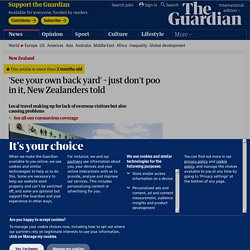
Restrictions on international travel due to Covid-19 have forced New Zealanders to holiday at home, with government data showing some holiday spots are busier than they were before the pandemic despite the absence of tourists from overseas. With New Zealand’s border closed to nearly all foreign arrivals since March, sites and attractions typically popular with first-time visitors such as Franz Josef Glacier and Milford Sound have recorded a huge decline in visitors, Radio New Zealand reports. But regions with driving distance of major cities – including Northland, Coromandel and the top of the South Island – have seen high growth as New Zealanders responded to the government’s call to support the struggling tourism industry and “see your own back yard”.
More powers sought to manage freedom camping. A group of tourism industry heads and mayors want more power to manage freedom camping, including a national vehicle track and trace database.
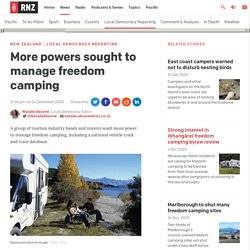
Representational image. Photo: RNZ However one long-time freedom camper is worried low-income Kiwi families will soon be shut out of some of the country's most picturesque locations. In November, Tourism Minister Stuart Nash announced plans to ban renting vans to tourists unless there is a toilet on board. It follows years of poor behaviour by freedom campers, many young international tourists, who bought or hired cheap vans that did not have toilets, leaving behind their mess for councils and residents to clean up. In 2018, the Responsible Camping Working Group was set up after protesters began blocking off parking sites, taking car keys off visitors and complaining en masse to local government.
Call to clean up freedom camping by ditching portapotties. The Parliamentary Commissioner for the Environment says “stop gap” efforts to clean up freedom camping have not worked, and it’s time to tighten the rules.
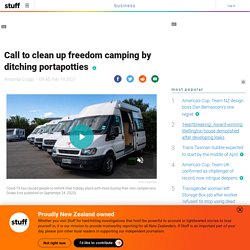
A report on sustainable tourism released on Thursday by commissioner Simon Upton describes freedom camping as one of the “most visibly contentious” sectors of the tourism industry. He wants standards raised so self-contained vehicles are required to have a permanently plumbed toilet, and ideally separate tanks for black and grey water, so porta-potties would no longer pass muster. Freedom camping needs new regulations and foreign tourists aren’t the only villains. Freedom camping has a long tradition in New Zealand.
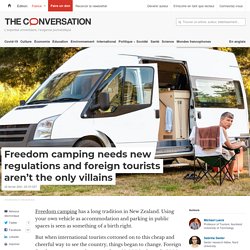
Using your own vehicle as accommodation and parking in public spaces is seen as something of a birth right. But when international tourists cottoned on to this cheap and cheerful way to see the country, things began to change. Foreign freedom camper numbers grew from 10,000 in the early 2000s to an astonishing 123,000 by 2018. This massive growth inevitably led to resentment in local communities. Crowding at car parks and beach fronts, road congestion, littering and campers using the natural environment as toilets became a major concern.
Perhaps not surprisingly, the latest tourism report this month from the Parliamentary Commissioner for the Environment devotes one of its four main recommendations to better regulation of freedom camping in Aotearoa New Zealand. West Coast, New Zealand. Part of keeping the West Coast and New Zealand beautiful is to be responsible with your waste wherever you camp.
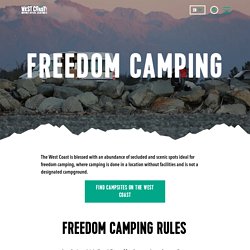
Carry in, carry out. Leave no trace. Don't ruin your holiday as non-compliance can result in a $200 infringement fee or a maximum $10,000 fine if prosecuted. And nobody likes finding a stack of toilet paper next to a pristine lake! Below is an AA link of all the dump stations along the West Coast so you can be a responsible camper. New rules to target freedom campers at Kaikoura. Tough new freedom camping rules that ban camping at a number of areas are being praised by Kaikōura residents.
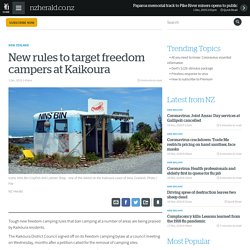
The Kaikōura District Council signed off on its freedom camping bylaw at a council meeting on Wednesday, months after a petition called for the removal of camping sites. The new bylaw will ban freedom camping at 11 areas from December 18, including popular surf spot Kiwa Rd, in Mangāmāunu, and in the Kaikōura township. Six sites, including the Scarborough St Reserve, will also restrict freedom camping to a maximum of a three nights over a month.
Let's Go Away shop owner Penny Betts thought the council's new bylaw would have little impact on the town's tourism. "People who want to travel will travel," she said. Camping ambassadors tackle freedom camping troubles in South Island. Responsible camping ambassadors are having a big effect on campers' behaviour and locals' attitudes towards them, authorities in the south's freedom camping hotspots say.
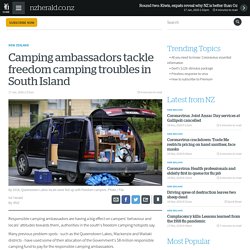
Many previous problem spots - such as the Queenstown Lakes, Mackenzie and Waitaki districts - have used some of their allocation of the Government's $8 million responsible camping fund to pay for the responsible camping ambassadors. Just a few years ago, some communities felt as if they were under siege. By 2018 residents of the Queenstown Lakes District were fed up with freedom campers and the local council took the extraordinary step of literally clamping down on errant visitors. Last summer, more than 1500 fines were handed out and 34 vehicles were clamped. The council doubled the number of enforcement officers this year but, despite that, the number of fines dished out is down more than 6 per cent on the same time last year. Gisborne freedom camping under review after complaints. Problems with freedom camping in Gisborne city and up the coast at Makorori have prompted Gisborne District Council to review its camping regime.
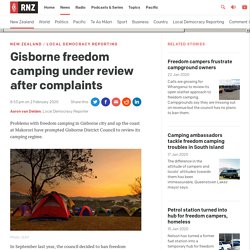
Photo: 123rf In September last year, the council decided to ban freedom camping in the Marina Park carpark adjacent to Taruheru River in Gisborne city over summer. The decision followed complaints about overcrowding in the carpark and campers showering and washing dishes and clothing beside the boat ramp. Loss of public enjoyment of areas set aside for freedom camping at Kaiti Beach and Makorori prompted the review, Gisborne District Council communications adviser Christine Boyce said. As well as freedom camping, managed under a bylaw, the council operates summer campgrounds in eight locations up the coast and at Doneraille Park, inland towards Wairoa, from September to April. People need a permit to occupy sites at the summer campgrounds, which they purchase in exchange for rubbish bags (collected by the council). Filling The Freedom Camping Blanks. This summer Kāpiti Coast District Council staff have been gathering information on freedom campers in Kāpiti, with early results providing some useful insights into visitor behavior and experience.
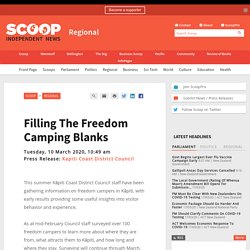
As at mid-February Council staff surveyed over 100 freedom campers to learn more about where they are from, what attracts them to Kāpiti, and how long and where they stay. Surveying will continue through March. The work to build a better understanding of freedom camping in Kāpiti is being supported by funding from the Ministry of Business, Innovation and Employment which granted Council $90,000 to assist with information gathering, on-the-ground monitoring and education with campers, and for improved signage. After freedom camping tourist spotted defecating in historic reserve. A complaint has been made to a rental car agency after an Otago woman says she witnessed a tourist defecating in the bush at a historic reserve.
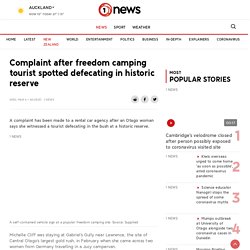
A self-contained vehicle sign at a popular freedom camping site. Source: Supplied Michelle Cliff was staying at Gabriel's Gully near Lawrence, the site of Central Otago's largest gold rush, in February when she came across two women from Germany travelling in a Jucy campervan. Ms Cliff said she saw one of the women defecate twice in the bush, and then found she had covered it with leaves afterwards. "My husband confronted her companion and said we had photographed the incident - she could only say that her friend 'had the runs'," Ms Cliff said. "We had been talking to both of them prior to this incident and had talked about the importance of being self contained, which their van was. " Is it time to start charging freedom campers?: 'There is always going to be a cost' Returning to New Zealand after some 13 years overseas, Darren Johnston decided it was high time he explored his own country properly.
Re-fitting a ute, he set out on two trips which saw him travel the length of Aotearoa, pitching his tent at both paid and free campsites. He was amazed by how "absolutely stunning" some of the freedom sites were but, with many suffering from overcrowding and the number of freedom campers continuing to climb, Johnston believes freedom camping as we know it is unsustainable. "The real issue is not what is happening right now, it is what will be happening in another five to 10 years time. " he said. "The impact to the beauty and ecology of these sites may be beyond repair if the issue is not addressed correctly. " Freedom camping - NZ Government.
Freedom camping is when you camp on public land that isn’t a recognised camping ground or holiday park. Make sure you plan your journey and respect the area you camp in. Where you can freedom camp You can freedom camp on DOC (Department of Conservation) and local council land. Your vehicle may need to be self-contained depending on the bylaws that apply in that region. The rules about freedom camping apply to: 'Arrogant and disrespectful' freedom campers sadden Ngāi Tūhoe. Rubbish-strewn campsites, home-made toilets and illegal felling of native trees by "arrogant and disrespectful" freedom campers at Lake Waikaremoana have shocked and saddened Ngāi Tūhoe.
Several rubbished-strewn campsites were found over Labour Weekend on the lake shore, under the Panekire Ranges, included large fire sites near native bush, lots of ground cleared and native bush cut down for firewood. Photo: Supplied This included several illegal campsites found over Labour Weekend on the shores of the lake which appeared to have been established by campers clearing native bush with chainsaws. "It's disrespectful and arrogant," Tūhoe Te Uru Taumatua chair Tāmati Kruger said. "Freedom campers are basically taking liberties ... there's people with alcohol, people cutting down trees, people establishing a camp for themselves with showers, toilets.
" The iwi had discovered dozens of such cases since taking over the management of the land in 2017. Camping crackdown: Eleven people fined for illegal freedom camping over summer period. Eleven people were hit with fines after illegally freedom camping in DoC-controlled spots over summer, with the department taking in $2200 for campers' misdemeanours. Figures from the Department of Conservation released to the Herald on Sunday show rangers and wardens working for the department issued nine fines to people camping in the Central Plateau area over summer.
It comes as councils aruond the country wrestle with public consulation over freedom camping bylaws in individual regions. Under DoC's watch, one fine was issued to someone camping around Tongariro National Park, and another person was penalised for camping around the Franz Josef glacier. All of the fines came to the value of $200, issued to groups of people failing to abide to rules laid down for campers in the area.
'Do Kiwis like stinky people?' Freedom campers bemoan Golden Bay facilities. Each evening, Julius, Noelle, Lucy and Kalle turn off the road and park by a river or a roadside in a freedom camping spot. The young German tourists unfold a camping table and chairs, and cook a meal. They eat pretty well, even adding wine to their tasty stews. They've enjoyed their time travelling around New Zealand. "People are open and happy," Lucy said. Kaikōura's new freedom camping site could spell disaster for threatened bird species. The Kaikōura District Council has been criticised for establishing a freedom camping area at a significant breeding site for an endangered bird species.
The freedom camper who wants to ban freedom camping. Jennifer Branje has spent the last six months freedom camping around the South Island. Crackdown on freedom camping in Golden Bay working, council says. Freedom camping is causing fewer headaches in Golden Bay this year, and council staff are happy with how the new rules are working. Last summer the area was inundated with travellers parking up around Takaka, in particular along the river at Reilly St behind the memorial library, where hundreds of people had set up camp. Freedom camping: 5 of the battlegrounds. Freedom campers awaited. As the start of the new camping season looms, Dunedin is readying itself for thousands of freedom campers expected to flock to the city during the next six months.
Thursday is the official start of the season and coincides with the Dunedin City Council stepping up its enforcement and the opening of the new trial inner-city camping site in Thomas Burns St. Council parks and recreation group manager Robert West said the trial site, with room for about 65 non self-contained vehicles, would be ready for the first campers on Thursday. On patrol catching Wanaka's unwanted freedom campers - NZ Herald. By Rob White of the Wanaka Sun As Wanaka's shops, cafes and restaurants begin to wind down of an evening, there is activity on the lakefront.
When 9pm draws near each night, Queenstown Lakes District Council's (QLDC) enforcement officers will begin their patrol. And, after several months of asking to tag along, the Wanaka Sun was invited to see firsthand what goes on. I make my way down to the Dinosaur Park just before 9pm and I am greeted by Ricky Campbell, operations manager for Cougar Security, the firm QLDC has outsourced its enforcement to. He's been doing the job for five years and in that time, he's seen it all.
He once found seven vans on school land claiming they stayed awake at night and slept in the day. Freedom campers in Rotorua: It's a great way to travel - NZ Herald. Freedom campers enjoying Rotorua say they follow the rules and the practice is a good way to travel. German friends Tanja Gentz and Mary Koch camped at the lakefront by the yacht club last night. They are five months into their six-month journey around New Zealand. Whananaki North residents fed up with freedom campers overloading reserve - NZ Herald.
Residents at a popular seaside location are sick of freedom campers urinating into the estuary and carrying out daily hygiene routines across the road from their homes Whananaki North residents Terry and Wendy O'Shea, who live opposite the public toilets, believe the council should give more consideration to ratepayers, rather than those who camp for free on the banks of the estuary 42km northeast of Whangarei. Nelson plagued by influx of freedom campers. Freedom camping by international visitors in New Zealand. Freedom Camping in New Zealand: Free Camping, Cheap Camping, Camping Sites, Campgrounds, Camp Grounds. Camping in New Zealand is an extremely popular activity for New Zealanders and overseas visitors, as many camping grounds are located in some of the most beautiful and scenic areas of the country.
Tents, caravans, campervans and motorhomes are pitched and parked in campsites and holiday parks throughout the year. 60,000 international tourists give freedom camping a go. 2016 report on freedom camping in Christchurch. Checkpoint with John Campbelll. Not all freedom camping is bad. Minister: An opportunity to address freedom camping. Anger at freedom camping in Makorori. Freedom and Wild Camping in New Zealand. Nelson freedom camping area 'a mess' Freedom campers out of control in Tauranga - NZ Herald. Freedom-Camping-Literature-Review-Report-March-2018.